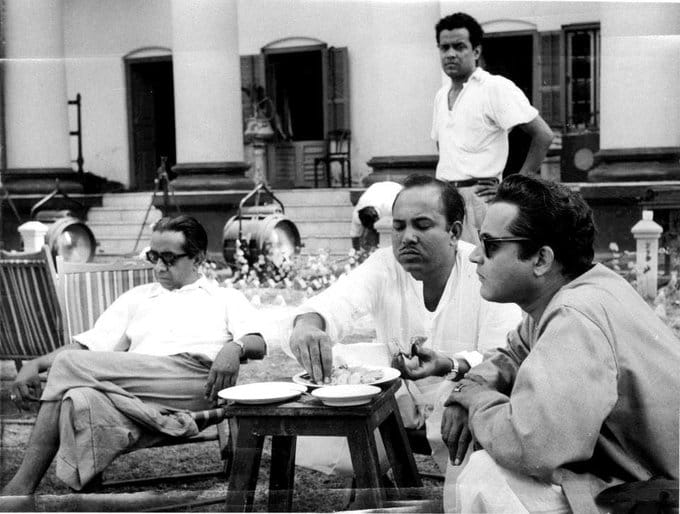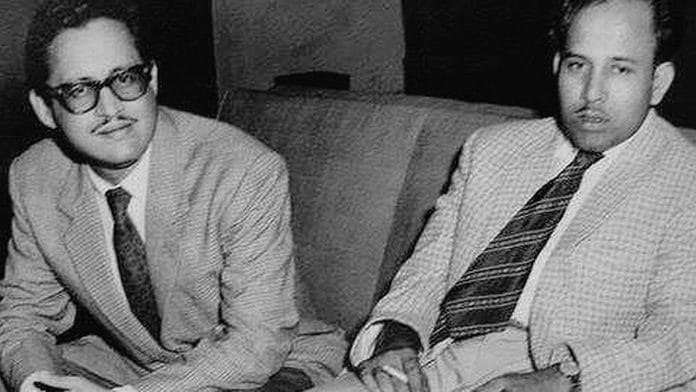New Delhi: “A writer has to know a character as well as a mother knows her children. Just as a mother knows, when she turns around and glares with angry eyes at two of her children who are making mischief in the corner of the room, that one of them will cower in fear and the other will stick his tongue at her, so the writer must also know how each of his characters will react to any situation.”
This was the philosophy of the writer, director and film personality Abrar Alvi. He was best known as the screenplay writer for many films of the legendary director, actor and producer Guru Dutt. But in reality, he was his mentee, collaborator, confidante and close friend.
A prolific writer, Alvi’s artistic and professional life was so inherently tied to Guru Dutt, that it is perhaps impossible for any discourse on the writer to exclude Dutt. Take, for example, Sathya Saran’s biography on Alvi: Ten Years with Guru Dutt: Abrar Alvi’s Journey. The book consists of conversations between Saran and Alvi stitched together to build a narrative of his life, his beginnings in the film industry and the key professional and personal experiences that shaped him. On its cover is a black and white still of Guru Dutt, and no photographic sign of Alvi himself.
It was a strange sort of predicament, as even though working with Dutt opened up many possibilities for Alvi, it also meant he stayed under his shadow and often did not get credit where it was due. But as the book points out, Alvi might have been bitter in his last years about not receiving his fair due for his work in masterpieces like Sahib Bibi Aur Ghulam (1962), but he was still proud to have been a crucial member of Dutt’s inner circle and fondly remembered cinematic adventures they took on together.
Also read: Remembering Guru Dutt, the genius filmmaker
He honed his skills on love letters
Born in 1927, Abrar spent much of his education in Morris College, Nagpur, engrossed in debating, elocution competitions, and eventually writing and directing for theatre. At the time, female roles were few and far between and were played solely by men. Tired of this conservative norm, Alvi began the search for an enthusiastic female actor and chanced upon a young Christian medical student from Lucknow. Her father refused to let her be part of the production, but the interaction did result in a sweet college romance between her and Alvi. Much to her delight, Alvi would write her long, romantic letters that soon became the talk of his college hostel.
“I did not realise it then, but it was my first brush with the discipline of daily writing, and of pushing my creativity to perform on command,” he told Saran. “In each letter, I would address her differently. I never ever used her name, and I would ensure that each letter was as fresh and as engrossing as the previous one.” At the time, his writing skills came in handy to impress his peers and help them overcome their own romantic problems, but soon it was a skill that became a defining feature of his life.
After years of dabbling in theatre, and a stint directing radio plays, Alvi eventually entered the Bombay cinema scene with the help of his cousin, the young actor Yashwant. Through him, Alvi got an opportunity to work as an assistant director to C.L. Dheer for the film Bahu Beti (1965). Alvi worked his way into the scene with his keen sense of emotions and dialogue and his ability to work with actors before their scenes to help refine their histrionics and dramatic expressions.
But it was on the set of Baaz (1953), in which Yashwant had a small role, that Alvi was eventually noticed by Guru Dutt, who soon offered him the position of a writer in his production company. The only caveat was that Alvi had to be present on set every day, directing actors through their scenes and their dialogues. He did this for Guru Dutt as well. Before each take, Dutt would ask Alvi to deliver each of his dialogues replete with inflections and dramatic intonations, and he would then close his eyes, process it take his cue and enact the scene.
Also read: Mr. & Mrs. ’55, a light-hearted rom-com that raised questions about feminism 6 decades ago
A maverick in his own right
From initially re-writing scenes to influencing plot decisions and then writing his own scripts, like for Mr. & Mrs. ’55 (1955), Alvi had an incredible learning curve with Guru Dutt Films. But he is perhaps most remembered and respected for the way he transformed the perception and practice of dialogue writing.
Since his college days, Alvi hated the way dialogues were written for films, and felt they were very disjointed from how language was spoken in real life. “I found them artificial and stilted. It was, of course, a legacy of the theatre, but the fact remained that the speech was nothing close to the way the common man spoke,” he told Saran.
The colloquial word ‘dialogue-baazi’ is perhaps a testament to this gap between reel and real life, as the word is typically meant to imply a certain lack of believability or filmy melodrama that was not authentic.
Cinema studies professor Harsh Trivedi echoed this idea by citing another phrase — “Kya ‘dialogue’ maar rahe ho?” (Why are you spouting a ‘dialogue’?), that indicated the peculiarity of cinema’s Hindi language in films of that period.
Film academic Anubha Yadav points out that this was probably because at the time the story writer, screenwriter, dialogue writer and dialogue director were distinct roles taken on by different individuals, which often meant a lack of cohesion in the spirit of the characters and the language they spoke.
Alvi, however, was all of these and more rolled into one.
For Aar Paar (1954), he convinced Guru Dutt that the dialogues must reflect the personalities of the characters. He believed that a character’s personality was a “sum total of a person’s or character’s environment, upbringing, education and background”, and their dialogues needed to be a reflection of that. Hence, for all the five protagonists of the film, he created almost five different languages — one for the Christian young lady, another for the Punjabi father, one for the Parsi comedian, a blend from the MP-originated Bombay taxi driver and a Lucknow twang for the Qazi friend.
The Saheb Bibi Aur Ghulam controversy
To understand the depths of Guru Dutt and Alvi’s partnership, as well as the extent of Abrar’s immense talent, there is possibly no better film to look at than the 1962 superhit Sahib Bibi Aur Ghulam. As a writer, Alvi gave the project his all.
Guru Dutt had read the original novel and seen the Bengali play in Calcutta. But since Abrar could not adapt the story without knowing Bengali, the writer Bimal Mitra was brought down to Bombay and Alvi and he spent almost a year cooped up in a bungalow in Khandala working on the screen adaptation.
Alvi tweaked the story to make it more suitable to the screen, made the narrative cohesive and added nuance to the various themes of the story such as feudalism, colonialism, patriarchy and marriage.
Over the years, he had learned a great deal from the women he knew personally and professionally — whether it was his close working relationship with Madhubala, who once asked him to write a script for her to direct, his nurturing of Guru Dutt’s greatest discovery Waheeda Rahman, to most importantly his deep friendship with a sex worker named Gulabo, on whom he based a character in 1957’s Pyaasa.
With his insights, he was able to write multi-dimensional characters for the two main women in Sahib Bibi Aur Ghulam — Chhoti Bahu played by Meena Kumari and Jaba played by Waheeda Rahman.
But most importantly, Alvi took on the task of being a first-time director for the large-scale and high budget film. Guru Dutt was not in the frame of mind to act, produce and direct the film, especially in the aftermath of his last flop, Kaagaz Ke Phool (1959), but wholeheartedly trusted Alvi to bring his own vision to life.
Alvi, who for so long had only been officially credited as a screenwriter despite his various contributions to Guru Dutt’s films, was never recognised as being the film’s real director and was often dismissed as just having assisted Dutt.

Part of this perception problem could have been the undervalued idea of a writer’s role. But it was more the fact that this was the period of auteurs — larger-than-life film directors who had a signature style. According to Yadav, the “industrial combination of producer-director lent a far greater chance for them to become the only ‘representatives’ of their films”, and Guru Dutt’s larger-than-life persona was a testament to this.
Hence, Dutt’s cinematic voice became far louder than those who were behind the scenes working for him, and who or what made up that very voice were never questioned.
Perhaps Abrar Alvi’s story is so important because it calls us to closely examine all the parts that make a whole in all kinds of art-making. But in the end, his legacy is that of an extraordinary film personality who exemplified the golden age of Indian cinema.
Also read: Sahib Bibi Aur Ghulam took on adultery way before Supreme Court did







When a director writes and direct he can claim full credit. Writing I suppose is more than half the work. Similarly songs are written by someone, composed by another and sung by the singer. But we strangely call it Lata or Kishore song. Many western singers and bands wrote their own songs, composed them and sang.
Nicely written. Guru Dutt was great creative, innovative and perfectionist actor, director and producer of Indian Film Industry. Payasa, Kagaj Kae Phool, Sahib Biwi Aur Ghulam were superb movie. His untimely death really shocked not only film industry but millions of fans including me. His performace in last scene of movie Kagaj Kae Phool was wonderful which depicted his highest skill. Anyhow, he will be remembered forever by his fans through his marvellous movies.